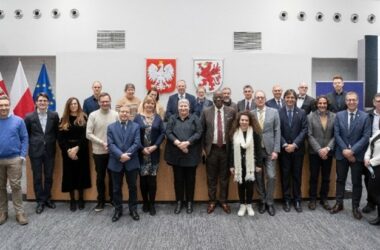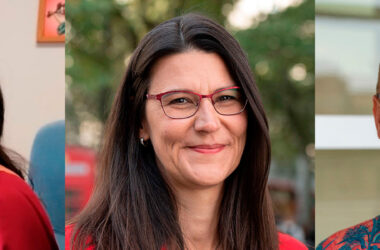To understand the importance of the cell cycle, it helps to note that every living organism on this planet traces its origins back to a single original cell. For an organism to function normally, cell division must occur at the right pace; in fact cancer is caused by uncontrolled cell division. Paul Nurse’s (b., Norwich, UK, 1949) made seminal contributions to our understanding of how this cycle is regulated. Through his studies of yeast, he described the functions of cdc2, a gene that plays a major role in multiple stages of the cell cycle, and subsequently identified its human counterpart, CDK1. This breakthrough earned him and fellow researchers Timothy Hunt and Leland Hartwell the Nobel Prize in Physiology or Medicine.
Nurse is currently the director of the Francis Crick Institute, one of the most prominent research centres in Europe. His career also led him to be part of the University of Oxford, as well as preside over the Rockefeller University in the United States, and the Royal Society in the UK. Not only has he contributed to a greater understanding of how life works, but he has also shed light on its secrets, through books such as ‘What Is Life? Five Great Ideas in Biology’. On Wednesday the Pablo de Olavide University, in celebration of the 25th anniversary since its foundation, awarded Nurse the title of honorary doctor. The following conversation took place in UPO’s headquarters in Carmona, a historical town located a few miles away from Seville, where he met with his colleagues during his stay.
Every scientist who wins a Nobel prize might be tempted to think this signals the peak of a career. Considering that in your case you also run a leading European research institute in Biomedicine, the question would be: what motivates you to keep working?
I think it really is a curiosity about the world, wondering how it works. In particular, I work on cells, yeast cells. I am absolutely fascinated and have been fascinated for decades about how they work, how they control their reproduction and go from one to two, and all the mechanisms involved.
I think I much prefer that research than running the institutions I have to run. In fact, I run the institutions and then I don’t feel guilty about doing the research that I want to do. But my main enjoyment is my research.
The Francis Crick Institute aims to study life sciences and their subjects at every scale; from molecules to organisms. To achieve that, it brings researchers from a wide range of disciplines together. This matches one of the tenets that guide the practice of research at the Universidad Pablo de Olavide. What is, in your opinion, the value such multidisciplinary teams bring to the goals of the Institute?
I set up the Francis Crick Institute, and central to my thinking was to reduce barriers between individuals working in different areas. So I merged three pre-existing institutes, but I abolished all divisions and departments, and so there are none in the Crick. There are 120 research groups, but no departments, no divisions. And this reduces the barriers between people who are working on molecules and people who are working on human beings and that means new things happen, because when you have two areas, it’s in the boundaries that often there’s new discoveries.
And the architecture of the building, which I also could influence, is designed to mix people up. It is designed so that you just run into people randomly. So all of this is promoting interactions between people from different disciplines. I think it’s very, very important, particularly in the life sciences today.
You once stated that being the most brilliant student does not necessarily guarantee becoming the best researcher. What actions do you take at the Institute to detect, acknowledge and promote talented young researchers?
So, I think that boundaries are broken most often by the young, so we have to encourage and support them. They may not always know exactly what to do. They may be a bit green in some ways. But they are more likely to be bold. To be challenging, to look at new things. So, I look for students who show those characteristics, that wish to push the boundaries. And because the Crick Institute is quite popular, we have 1500 applicants for our graduate program of 30, it means that we can select some of the most interesting things from students from all around the world including, I must say, from Spain as well. So it’s designed, really, to promote youth, both young graduate students, but also young group leaders as well, across the board.
If you could say anything or offer a piece of advice to students pursuing a career in scientific research, what would that be?
I think being a scientist is wonderful, but you have to be very resilient. Because if you’re working at the edge of knowledge, you will fail a great deal. And students don’t realise that when they come into a lab and do their own research, how often it fails. And so you have the confidence to continue and you have to choose a supervisor who will help you through those difficult times.
So it’s really resilience, as well as being intelligent, as well as working hard, as well as being experimentally good. It’s being resilient, when you don’t get things to work.
In your book ‘What Is Life?’ you explain in plain words basic principles of biology and share your passion for science.
I tried to write a book that if it was read in 30 years or 50 years, it would still be basically correct. So I didn’t speculate very much. What I wanted to reveal is how interesting life is, and I think what we will see in the coming decades is unravelling the complexities of a single cell and how it works. And I think this will be a major objective in life sciences, an important one for cultural reasons, really, of understanding things. But also important for medicine and also important to other applications. I think we are entering into a time when the life sciences have much to contribute both to our civilisation and also to the good of humankind.
The UPO features a specialised centre in developmental biology. Are you familiar with the work that smaller centres like CABD do in the field of cell biology?
Yes, I am familiar with what is happening here. One of the individuals who worked in my laboratory some years ago, Juan Mata [sic] was a rector here. I have many contacts with him and also with many Spaniards who have worked in my laboratory, who have all come here together, actually, for this very nice gathering that we’re having today and also for the ceremony tomorrow.
«Brexit has been a disaster for Britain, I recommend no other country in the European Union considers it»
The new deal for Northern Ireland could open the door to the return of the UK to the Horizon Europe programme. After the first years of negotiations, how is research in your country being impacted by Brexit?
Brexit has been a disaster for Britain, I recommend no other country in the European Union considers it. It’s been a disaster for our economy, a disaster for our reputation in the world, but it is also being very difficult for researchers.
We have seen complexities and difficulties with the Horizon Europe, which hopefully we will now be able to change. I predict we will return to Europe in the future, I don’t know how long that will take, but in the meantime we have to do everything we can to work as much as possible with our closest neighbours, with whom we share so much culture, so much history, and also so much science with, which have been built up over the decades of my life and which we cannot afford to lose. It’s absolutely critical we get these strong links back to Europe.
You are still an active researcher while simultaneously leading a large institution like the Francis Crick Institute, which houses over 2000 people. Juan Jiménez, who once collaborated with your unit, then took on managing duties before even becoming rector of the UPO. Do you see management as a burden to a scientist, or is it part of the job?
I see management, or leadership, as a responsibility for people to do. I have had quite major management responsibilities, and have spent half my life running institutions or founding institutions, and doing my own laboratory research. If you are still at the coalface, at the front of research, it helps your management, because it means you understand what’s going on in the real world, and you’re not getting reports from many people that come up to leadership. So I think it helps management, if you’re still an active researcher or an active teacher.
Along with your distinction as honoris causa, the title of honorary doctor, the Universidad Pablo de Olavide also acknowledged your team’s work by awarding Jacqueline Hayles with a medal of honour. You co-authored multiple papers with her. What would you highlight about her work as a scientist?
Jacqueline Hayles was my first graduate student. She was a mature student, she was older than me. She left school at 16 or 15, and did a PhD with me when she was nearly 40 years of age, very unusual. And she stayed with me, working in my lab for the rest of her working career.
She has contributed in many ways, sometimes invisible beneath the scene. But she always contributed greatly to the work that I’ve done and the work with fission yeast. She would have loved to have been here but she couldn’t come and she’s very disappointed about that.





